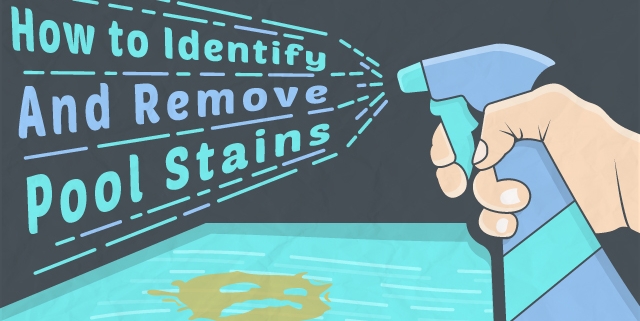How to Identify and Remove Pool Stains
Stains are one of the most irritating detriments to their investment that a pool owner can endure. To address this problem, the source of the stain must be identified, and the appropriate solution introduced as soon as possible.

Pool stains generally fall into two categories:
- Metal or rust-based: Metals can accidentally be introduced into pools from well water or corrosion from copper pipes.
- Organic: Leaves, berries, and other organic debris can also leave stains if allowed to settle on pool surfaces.
The best way to distinguish metal from organic stains is by color. Different color combinations provide good indicators of exactly what substance is causing a given stain:

Green and Brown Stains
These stains are most likely organic stains caused by leaves or other plant matter.
Red and Blue Stains
These stains are more than likely from brightly colored berries; check the area around the pool for the offending bush.
Blue, Green and Black Stains
When a stain is a mixture of dark blue, green and black, and there is no evidence of organic matter, it is likely to have been caused by copper.
Green, Brown and Red Stains
This combination indicates iron as the culprit.
Brown, Black and Purple Stains
This dark color combination is caused by manganese.
Once you’ve got a good idea of the cause of a stain, it’s time to test the theory and confirm the source of the problem. If an organic stain is suspected, try applying a small amount of chlorine directly to it. An organic stain will come away easily.
Metal stains, on the other hand, react best to ascorbic acid, which is vitamin C, most often found in citrus fruits. The best method is to apply some ascorbic acid powder to the stain, and see if it is removed or lightens.
How To Get Rid of Pool Stains
For Organic Pool Stains
Organic stains are best addressed by super chlorinating the water, then brushing. First, test the water to ensure the balances of pH and alkalinity – pH should be between 7.4 and 7.6, while alkalinity should be between 100 and 150 ppm (parts per million). Use can use test strips to test the water.
For multiple or large stains, the water should be triple shocked by adding 3 pounds of calciumhy pochlorite pool shock for every 10,000 gallons of water. Remember always to shock at dusk, or at night, for best results.
Once it’s been shocked, thoroughly brush all the stains, then let the pool circulate for at least eight hours. Continue to brush the stains intermittently, and keep the chlorine level high until the stains are finally gone.
For Metal Pool Stains
Metal stains can be a little more difficult to get rid of, but they’re not impossible. The first step is to take a water sample to your local pool care retailer to determine exactly what kinds and levels of metals are plaguing your pool.
After that, you can use a metal stain remover to treat the stains on your liner. Use the remover according to manufacturer’s instructions, brushing the stain to help the process along.
Future Prevention
Preventing pool stains is as important, easy, and important as any other facet of pool maintenance.
To keep organic stains from forming, make sure to keep the correct level of sanitizer (i.e. chlorine) in the pool at all times.
Make sure pH and alkalinity are balanced, to keep the sanitizer working properly. Keep your pool clean by regularly vacuuming (manually or with an automatic pool cleaner) and skimming the surface of the water.
The best preventative measure against metal stains is to test water regularly for the presence of metals, and address it before stains form. If your pool is prone to metal contamination due to well water or other factors, be sure to use a metal sequestrant to prevent metals from binding to pool surfaces.
In the case of a copper problem, it’s worth noting that low pH can also cause a recurrence of stains. Low pH indicates acidic water, which corrodes copper and introduces it into your pool. Adjust pH levels accordingly.
Happy Swimming!
Font: https://www.swimuniversity.com/pool-stains/










Leave a Reply
Want to join the discussion?Feel free to contribute!